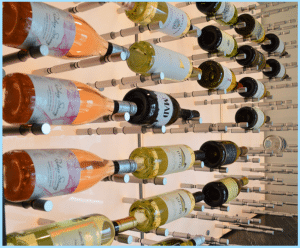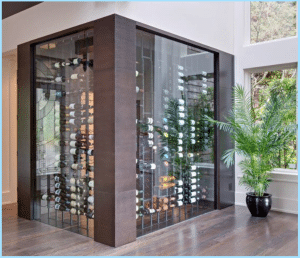Wines need a safe haven where they can mature gradually. One very good example is a wine cellar. Wine cellars are equipped with materials and equipment that promote the ideal wine cellar conditions.
To ensure that your wines reach their optimum age while being stored in a wine cellar, you need to consider these factors:
Temperature
Wines can easily be affected by temperature. Too much heat can hasten the wine aging process, and too much cold can slow it down.
Either of these two conditions will result in undesirable changes in the wine’s taste, aroma, color, and overall wine-drinking experience.
The ideal temperature inside a wine cellar is 50-59 degrees Fahrenheit.
Insulation
The wine cellar insulation system is like a support system that helps achieve the ideal wine cellar temperature inside a wine cellar. The insulating material should have a sufficient rating, or, “R” factor. Insulation is applied to the walls and ceiling of a wine storage room.
If the insulation has a poor rating or is improperly installed, it can result in fluctuating temperatures and, consequently, the overworking of the cooling system.
Humidity
Humidity is the amount of moisture present in the air. If the humidity inside the wine cellar is very high, it can cause mold growth on the wine labels, as well as undesirable changes in the wine. If the humidity is too low, it can lead to the drying out of the cork. When the cork is dried, air can easily enter the bottle and cause oxidative changes in the wine.
The ideal humidity level inside a wine cellar is 60-75 percent. Therefore, having a properly installed and commercial-grade wine cellar cooling unit is a must to keep your wine cellar at its optimal temperature.
Seal
Ensuring a tight seal in the wine room is also important. This is the role of wine cellar doors, apart from securing and adding style to the wine cellar.
Wine cellar doors must have an automatic door bottom. This device is installed on the bottom part of the door edge.
It helps seal the cool air inside the cellar and prevents door dragging, which could otherwise damage the flooring.
Noise and Vibration
Noise is one element that should be looked into as well. Noise creates vibration, and vibration can potentially interrupt the natural wine aging process, disturbing the sediments at the bottom of the wine.
This is why a virtually quiet wine cellar cooling system is recommended. A split wine cellar cooling unit minimizes noise inside the wine cellar because the condenser, the part that produces noise, is installed outdoors, or indoors and away from the wine cellar itself.
Most wine racks have toe kicks that enhance the stability of the furniture, and prevent unstable movements should the wine rack be bumped into. This is really helpful in protecting your wines from vibrations and unnecessary movement.
Any other possible sources of vibration that can disturb wines should be eliminated.
These elements should be considered when building a wine cellar. It is recommended that you consult with a wine cellar design specialist as well so that you can go over every detail of the design.
Achieve Your Ideal Custom Wine Cellars With Our Wine Cellar Experts!
At Bella Vita Wine Cellars, we’ve been committed to providing exceptional services for over 10 years. Our expertise lies in
designing exceptional wine cellars for different types of homes. We understand that every business and brand has its own unique identity, which is why we focus on creating highly personalized cellars that reflect the brand’s personality.
Whether you live in Newport Beach, Yorba Linda, Corona Del Mar, San Juan Capistrano, Surfside, Dana Point, San Clemente, Costa Mesa, or any nearby city in Orange County, we’re here to help you plan your wine display and storage needs.
Our team of experts is always ready to lend a hand and guide you toward realizing your dream wine cellar. Just take the first step by reaching out to us, Bella Vita Wine Cellars, at +1 (714) 798 9858!



